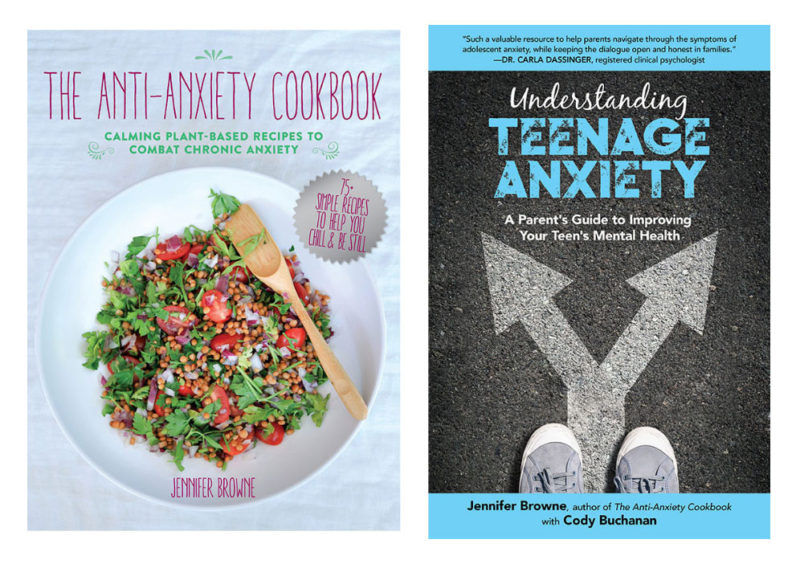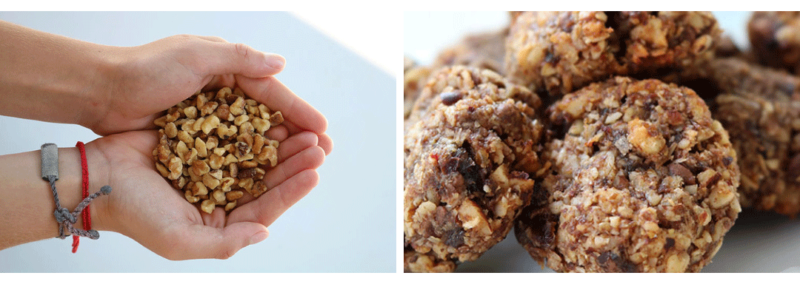If it takes a village to raise a child, then we should also acknowledge that it takes a village comprised of people with compassion, empathy, and openness to raising a child suffering from chronic anxiety.
For those of you reading this who have highly anxious kids, know that there are many of us who can relate. One of the things that has brought me great relief when dealing with my anxious child is that we don’t all have to reinvent the wheel: we only have to communicate our ideas and share our knowledge of what works and what can be worked on.
Anything that has the potential to be helpful in forging our kids forward on the path of better self-confidence, love, and understanding is something worth attempting to cultivate.
Making the Connection
Something that has brought my own child (now nearly twenty years old) closer to mental (and physical!) wellness is a solid understanding of the way food affects his body. Food affects all of our bodies; it is literally the fuel that powers us up, builds our cell blocks, strengthens our immune systems, ignites our brains.
There is a massive difference between foods that simply fill the tummy and foods that heal, protect, and help us grow.
If you’re familiar with chronic anxiety, you probably already know that anxiety is felt everywhere in the body, but especially in the gut. Often, the very first signs of anxiety are present there: the initial fluttering that occurs that quickly develops into digestive distress.
Harvard Health says “The gut-brain connection is no joke; it can link anxiety to stomach problems and vice versa…the gastrointestinal tract is sensitive to emotion. Anger, anxiety, sadness, elation—all of these feelings (and others) can trigger symptoms in the gut.”
In light of this, wouldn’t it make sense to ensure your anxious child is consuming foods that are as kind as possible to his stomach? Ones that offer the most nutrition possible, while minimizing digestive stress and food sensitivities?
By and large, the diet that falls into this category is one that is whole and plant-based, though it doesn’t have to be exclusively so. Every body is different, and we must all eat to care for our own genetic requirements. However, in terms of simplicity, here are some of the benefits of following the whole and plant-based model if you or your child is prone to chronic anxiousness:
Stable Blood Sugar
A whole and a plant-based diet are much lower in sugar than the standard American diet (appropriately termed SAD)—one that is comprised of processed food and an unreal amount of refined sugar.
The results of too much sugar consumption can cause a whole variety of negative symptoms, including blurred vision, brain fog, and excessive fatigue—all of which can easily be interpreted as signs of a panic attack. It can also cause shaking and tension, both of which can make anxiety much worse.
Give your child’s body the chance to stabilize its sugar levels by offering foods that are unprocessed, largely plant-based, and naturally low in sugar.
Healthy Blood Pressure
A consistently increased heart rate is one of the main contributors to an increase in blood pressure. When your child experience anxiety, his heart rate inevitably increases. That increase in cardiac output results in an increase in pressure that raises his systolic pressure in an unhealthy way.
Foods that contribute to a healthy heart rate include many types of fruit (those with lots of fibre, such as berries, are best), oats, and leafy, green vegetables. These foods tend to provide a calming effect, and therefore help to keep heart rates lower.
Maximized Energy and Decreased Digestive Distress
Consuming foods that are heavy and difficult to digest will inevitably require a lot of energy to process. This energy must be diverted from elsewhere, which is why we often feel sluggish after a big meal.
If the food your child is eating consistently does not contribute to increased energy, then that’s a sign of digestive distress: something is not working the way it’s meant to.
Helping your child to choose lighter foods that are easily digestible (such as plant-based foods) will help keep his energy levels consistent. It’s also helpful to eat many smaller meals instead of fewer large ones to keep the stress of simple digestion from overwhelming his gut.
Anxiety can contribute to a number of common digestive issues, including:
- Irritable Bowel Syndrome (IBS): characterized by cramping, bloating, constipation and/or diarrhea
- Indigestion: stomach growling and aches that are often accompanied by feelings of bloating, vomiting or nausea
- Heartburn: when stomach acid rises up the esophagus and causes burning pain in the throat
Increased Vitamin and Mineral Absorption
By optimizing your child’s digestive system via ideal food consumption, you cultivate an environment for optimal vitamin and mineral absorption.
Many people who suffer from chronic anxiety are vitamin and mineral deficient, due to inadequate bacteria levels in the gut. To combat this, be sure your child is taking probiotics and digestive enzymes, daily. Taking these via supplement form rather than relying on products like yogurt is better because many of us also suffer from dairy sensitivities.
The combination of probiotics, digestive enzymes, and whole, plant-based foods can completely change the gut environment for the better.
With benefits like these, doesn’t it make sense to add this type of food therapy tool to your child’s toolbox of anxiety relief solutions?
For more information on the connection between food and anxiety, consider purchasing copies of The Anti-Anxiety Cookbook and/or Understanding Teenage Anxiety.


